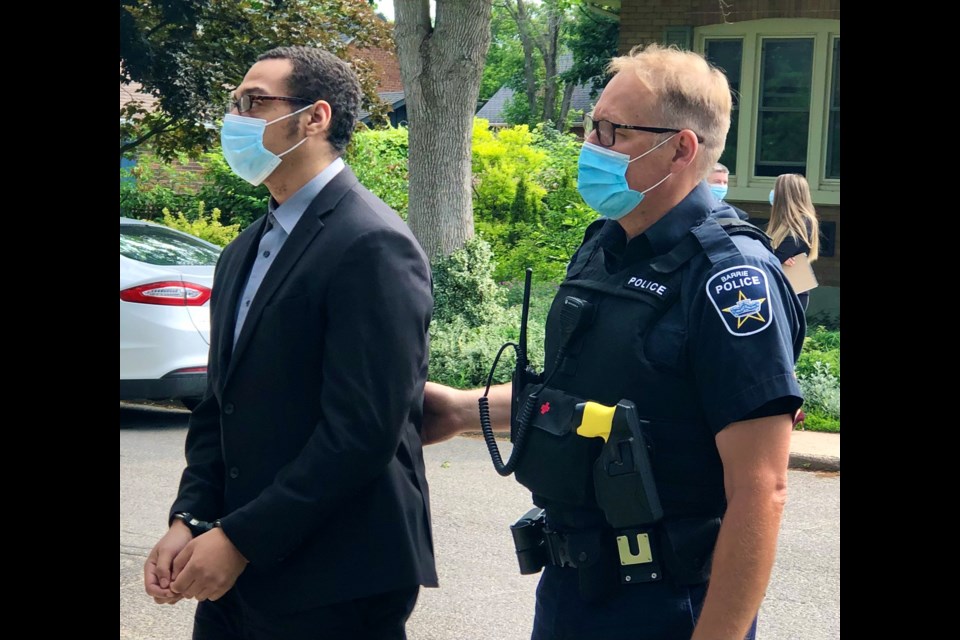Jennifer Crawford read her sorrowful victim impact statement to a Barrie court today, openly mourning the loss of her partner and his son, killed in a knife attack four years ago.
Then reading from her statement, Rose Beaton turned to Dyrrin Daley, sitting in the prisoner’s box during his sentencing hearing Wednesday, and told him directly how the stabbing deaths of her son, 19-year-old Nickolas Pasowisty, and his 51-year-old dad James Pasowisty, impacted those who loved them.
Daley, now 28, wearing a black jacket, black pants and a grey shirt buttoned to the neck with canvas-top shoes like he had throughout his five-week trial last summer, was convicted in August of two counts of second-degree murder, which carry an automatic life sentence.
Justice Vanessa Christie must decide how many years he will spend in prison before he can be eligible for parole.
“My son and I, as well as my two other children, have been really affected by this,” Crawford said tearfully. “Jamie was a really good dad.”
Crawford said she was also traumatized by the way she learned of the deaths, when eight officers showed up at her house with their weapons drawn when she was in her driveway.
“Dyrrin committed a crime that only God could forgive,” Crawford added.
Describing the killings as a “disgusting, animalistic, satanic attack," Beaton addressed the killer directly and told him what he did on Feb. 8, 2017 changed many lives.
“When I try to think about my son… images of what you have done come to my mind and that’s all I can see,” said Beaton, who attended the trial daily, as has Crawford.
Crown attorney Kristin Smyth read in the victim impact statement written by Crawford’s 11-year-old son, Jude: “I really miss my dad and Nick,” she read to the court. “He will never see me grow into a man. I love them very much.”
Smyth told the court the Crown is seeking a parole ineligibility of 20 years.
Listing the aggravating factors, she recounted some of the details of how the two victims were each repeatedly stabbed, leaving a horrid scene for the first-responders.
She said the motive of “this senseless murder” remains unknown. Daley said he went to the Pasowistys’ upper unit of an Allandale house in the middle of the night to buy marijuana from his regular dealer, James.
But Smyth described the bag containing a pellet gun, a baton and a flashlight he said he brought to make a deal as the only weapons in the home that night. He also had a double-bladed knife, which he used to repeatedly stab the men, whom she said should have felt safe sleeping in the sanctity of their own home.
Perhaps he wanted to even the score for when the elder Pasowisty didn’t show up at an agreed time to make a drug deal earlier, Smyth said.
“The intention was to come across these two individuals when they were their most vulnerable,” she said, adding that they were unprepared, unsuspecting and completely unarmed.
Among the teenager’s injuries was a severed Achilles tendon, which could have prevented him from escaping, Smyth said. There were also stab wounds to his chest and trachea that may have prevented him from talking when he twice called 911 eight minutes apart.
She said throughout his interaction with police, Daley showed no remorse.
But Daley had drafted a letter of remorse and, turning toward family members in the public gallery, he read out his letter containing an apology.
“From the bottom of my heart I feel truly sorry,” he said. “It wasn’t my intent for things to transpire to what happened. It breaks my heart that James and Nick are gone.”
Daley's lawyer, James Harbic, suggested the appropriate parole ineligibility is 16 years, four years less than what the Crown put forward. Minus the 1,730 days Daley has already spent in jail so far, he suggested the remaining time should be just under 12 years.
Harbic asked that the harsh conditions during the pandemic, which included 186 days of lockdowns, be included in the judge’s final consideration.
Harbic told the court that the automatic life sentence is the denunciation and sends out the message of deterrence. But the minimum time the judge must determine Daley will spend in prison before he can be considered for parole could represent hope to the killer who has most of his life still ahead of him.
“Especially to a young person, it provides hope,” said the lawyer. “That is the most important part of parole eligibility.
“If this was a hard-core criminal with antisocial values… that’s a different situation," Harbic added.
Daley isn’t committed to criminality and still possesses good qualities which he can build on through programming in prison to become a contributing member of society, the lawyer said.
Daley, he said, will eventually be out in the community as a “a relatively young man." A shorter parole eligibility, Harbic added, will provide him with the hope and incentive to prepare for his release while in prison through programming.
“As horrific a tragedy this is… (it’s) also a great loss and great tragedy to this young man,” said Harbic. “There’s hope for this man. There’s hope for all of us.”
When asked if he would like to address the court, Daley said he does plan to participate in programming while in jail, rehabilitate “and try to better myself.”
Justice Christie is to deliver her sentence Nov. 25.



